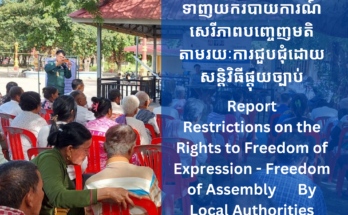March 1, 2012, Phnom Penh– Today, The Cambodian Human Rights and Development Association (ADHOC) held a press conference at central office in Phnom Penh to launch the 2011 Situation Report on Women and Children’s Rights. Head of the Women and Children’s Rights Section, Ms. Chhoun Chamrong presented the main points of the report to an audience of partners, donors and media and the executive summary, featured below, was distributed to attendees.
Executive Summary:
The Royal Government of Cambodia has made significant efforts in promoting the rights of women and children through setting in place policies and legislation to push for gender equity. Evidence of this can be seen in the adoption of the laws such as The Law on Prevention of Domestic Violence and Protection of Victims, and The Law on Prevention of Human Trafficking and Sexual Exploitation. The will to promote women and children’s rights is also strongly present in the National Strategic Development Plan (NSDP), indicating the government’s commitment to guaranteeing that these rights are respected. However, according to ADHOC’s research and observation there has been little improvement in the situation in 2011. Despite Government commitment and the dedicated work of NGOs, change takes time; it cannot be achieved overnight.
According to ADHOC’s statistics in 2011, there has been no notable decrease in the number of cases of domestic violence. The effectiveness of the implementation of The Law on Prevention of Domestic Violence and Protection of Victims, the Law on Prevention of Human Trafficking and Sexual Exploitation, among other laws, is still limited. In addition, the necessary attitude change and the understanding of women’s rights amongst both men on women form part of a large endeavor. While attitudes are in the process of changing and people are in the process of being educated, violations will still occur.
Even in cases where the victims were seriously injured by violent acts of domestic abuse, ADHOC found that they generally did not want their guilty family member to be punished; they only request divorce for example. This is linked to the above in that often domestic violence is seen as the norm and women themselves do not think it is criminal but a regular part of married life. Also when there is emotional attachment to the perpetrator, victims often do not want to report abuse. Both factors provide obstacles to the reduction of domestic violence.
Women’s opportunities to participate in work outside of the home are limited. This makes them more vulnerable to being victims of domestic abuse, or to putting up with violence, as they have less contact with people in their communities and they are completely economically reliant on their husbands. More generally, the breakdown of social morals and respect for others in Cambodian society also contribute to the culture of violence and aggression.
Based on the research and monitoring of ADHOC, it appears that 2011 is the first year in which the number of rape cases reported is likely not to increase compared to the past years. However the number of minor victims (under 18-years-old) is exceedingly numerous (72%), which is extremely concerning. ADHOC also noted that the relevant authorities have been working hard on preventing rape, however mediation is still widely being used to speed up legal action and victims are bought with civil compensation where perpetrators should instead be tried at court. Resolution through mediation by local authorities takes place in 11.34% of cases while 2.52% of all cases are handled by the court. The issue of mediation being used for the resolution of criminal cases has been a significant obstacle in the process of reducing instances of rape.
According to ADHOC’s investigation, sex trafficking is ongoing and happens throughout Cambodia and across national borders. The investigation process in these cases is often difficult as perpetrators hide behind legal businesses such as massage shops, karaoke, and night clubs. Moreover, most perpetrators are powerful and extremely secretive, therefore they avoid punishment. The relevant authorities frequently go to establishments to crack down on sex trafficking offenses. These interventions play an important role in rescuing victims who have been abused, and arresting and detaining the supervisors present. However the boss or patron of the establishment is rarely punished. Occasionally they are issued with an arrest warrant only but this is not followed up.
In 2011, the United States of America regarded the problem of trafficking in Cambodia as not being very serious. The US Embassy graded Cambodia a number two on a scale measuring the gravity of the problem in different countries. A report from the Embassy claims that the situation is improved sufficiently and that there is no need for ongoing monitoring of sex trafficking[1]. ADHOC partially agreed on this due to apparent commitment from the Royal Government to combating trafficking in 2012. Nevertheless, figures show that the number of reported cases of trafficking in 2011 rose significantly[2].
Labor trafficking, which has been regarded as the slavery of the 21st century, is on the increase. Owing to poverty, landlessness, low levels of education and the narrowness of the job market, many Cambodians are living in a deprived state. They have difficulty supporting themselves and their families, forcing them to leave the country to search for employment. They take very high risks in order to seek jobs in neighboring countries, especially Thailand.
According to ADHOC’s observations, it was noted that 2011 was the worst year so far recorded for violations against migrant workers, in particular amongst laborers who were sent to work in Malaysia. In most cases, the abuse against victims first takes place during their training as domestic workers in Cambodia and then continues or worsens during their work in Malaysia. The abuse of some female workers was so serious that it resulted in suicide or death. As a result of grave violations against the rights of domestic workers in Malaysia, the Cambodian government has postponed sending more workers to the country. The postponement is a positive step; however another complicated issue, which has arisen since this decision, is the loss of contact between the workers currently in Malaysia and their families in Cambodia. There are approximately 30,000 workers currently working in Malaysia, who are facing isolation and loss of communication with their relatives, as some companies had their labor export licenses withdrawn, and some companies were shut down. As a result it is very difficult to monitor the health and living situations of the workers previously employed by these companies.
The relevant institutions do not seem to follow up on the workers’ situations and living conditions and relate information to their families. There have been and continue to be many complaints to civil society organizations requesting help for their children, brothers and sisters working abroad. In summary, the workers who are still under contract in another country or who have now completed their contract but are in need of payment do not have a contact person in charge of monitoring their rights and safety. This leaves them unprotected and vulnerable to exploitation and abuse.
Overall, the legislative and policy framework for the protection and promotion of women and children’s rights is already in place in Cambodia. The commitment from Civil Society and the RGC is evident and will help to improve the situation. However, change cannot be achieved overnight. Altering attitudes and cultural norms that are deeply engrained is a slow process and women in Cambodia are still vulnerable to discrimination and abuse. Women are disproportionately affected by problems such as land grabbing and trafficking, and even though the legal mechanisms are in place, impunity for crimes against women is still high. Some progress has been made but much attention must continue to be given to the promotion of the rights of women and children in order for Cambodian society to develop with sustainability.



